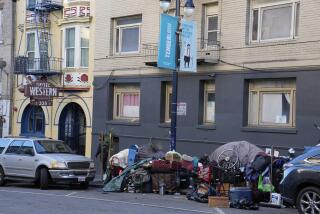For Homeless, Street News Is a Medium for Real Change
- Share via
SEATTLE — This is the home of the original Skid Road, when new-logged timber was sent skating down through robust but questionable neighborhoods to the harbor. Since then, the rough-and-tumble town has emerged as the high-tech jewel of the Pacific Rim. Today’s vagrants vie for sidewalk space with an array of restaurants, each offering a new and purportedly superior variety of nouveau-Northwest-poached-in-rainwater cuisine.
It’s enough to make a homeless guy go “hooey.” Real Change, Seattle’s monthly newspaper of the homeless, couldn’t be left on the sidelines. Not long ago, it offered up its Homeless Gourmet, instituting a four-point (four being the worst) “dumpster rating system” for the city’s rescue missions. Here, the discerning but temporarily unaboded palate could evaluate in a glance: “How many dumpsters would you go through before eating at this place?”
Almost everyone thought it was a hoot except the Millionair Club, a major charitable organization that, Real Change editor and founder Timothy Harris recalls, was serving undercooked chicken on the day the reviewer stopped in. He got sick; the Millionair Club, normally a tasty stop-off for the hungry and out-of-cash, got four dumpsters.
What better place than Seattle to trade journalistic war stories like these? Editors of more than 25 homeless newspapers across the country met here over the weekend for the founding conference of the North American Street Newspaper Assn. The group’s mission: to formalize and organize one of the most powerful innovations in homeless self-help of the past decade, the proliferating street newspapers that are providing an earnings source for the homeless and a strident new political voice for their communities.
Since New York’s Street News began publishing in 1989, at least 45 other homeless newspapers have sprung up in the United States and Canada, and dozens more are distributed through parts of Europe, Africa and Australia.
“There’s a street paper movement now, where five years ago, there was not,” said Harris, a conference organizer. “It’s happened because it’s meeting a need. People want to help people who are doing things to help themselves.”
For about a quarter, a homeless “vendor” can pick up a copy of a paper and sell it for a dollar. It beats panhandling, for many, and it turns the spotlight on issues that might otherwise be ignored by the mainstream press. StreetWise, which is preparing to move into a three-story, 15,000-square-foot headquarters in Chicago, is examining the impact of gentrification in that city and preparing an expose on black market shelters that are illegally charging clients up to 80% of their incomes.
State of the Struggle in San Francisco has begun a joint publication newsletter offering the shared views of Golden Gate Park gardeners and residents.
Seattle’s Real Change took issue with popular liberal Mayor Norm Rice, naming him “Grinch of the Year” on its cover when he cut back money for a tenants-advice hotline. It drew impassioned inquiries with the first-person account of a man jailed for two weeks for stealing a blanket from a U-Haul yard on a freezing night.
But journalistic fireworks can pale against the demands of putting out a paper that is largely written, produced and distributed by a volunteer staff with no fixed address. How do you get vendors to come to meetings? That was only one of the more ubiquitous refrains.
Then there is Boston’s Spare Change, where the co-founder and managing editor broke into the office one night in 1993 and walked out with the walkie-talkies, an electric typewriter and two computers. “The only reason I didn’t take the fax machine,” he said in a defiant voice-mail message, “was I couldn’t carry it on my back!”
Circulations are booming. Seattle sells up to 32,000 papers a month; San Francisco has sold 2 million papers in nine years. The secret to success, the editors say, is the $75 or $100 a month most vendors take home, money that no welfare department can tell them how to spend.
“We tell them, you’re not out there asking for a handout,” said Real Change’s head of vendor training, Ozula Sioux. “People are not giving you money because they feel sorry for you. . . . You’re out there dispelling the notion of what it means to be poor and homeless.”
More to Read
Sign up for Essential California
The most important California stories and recommendations in your inbox every morning.
You may occasionally receive promotional content from the Los Angeles Times.






